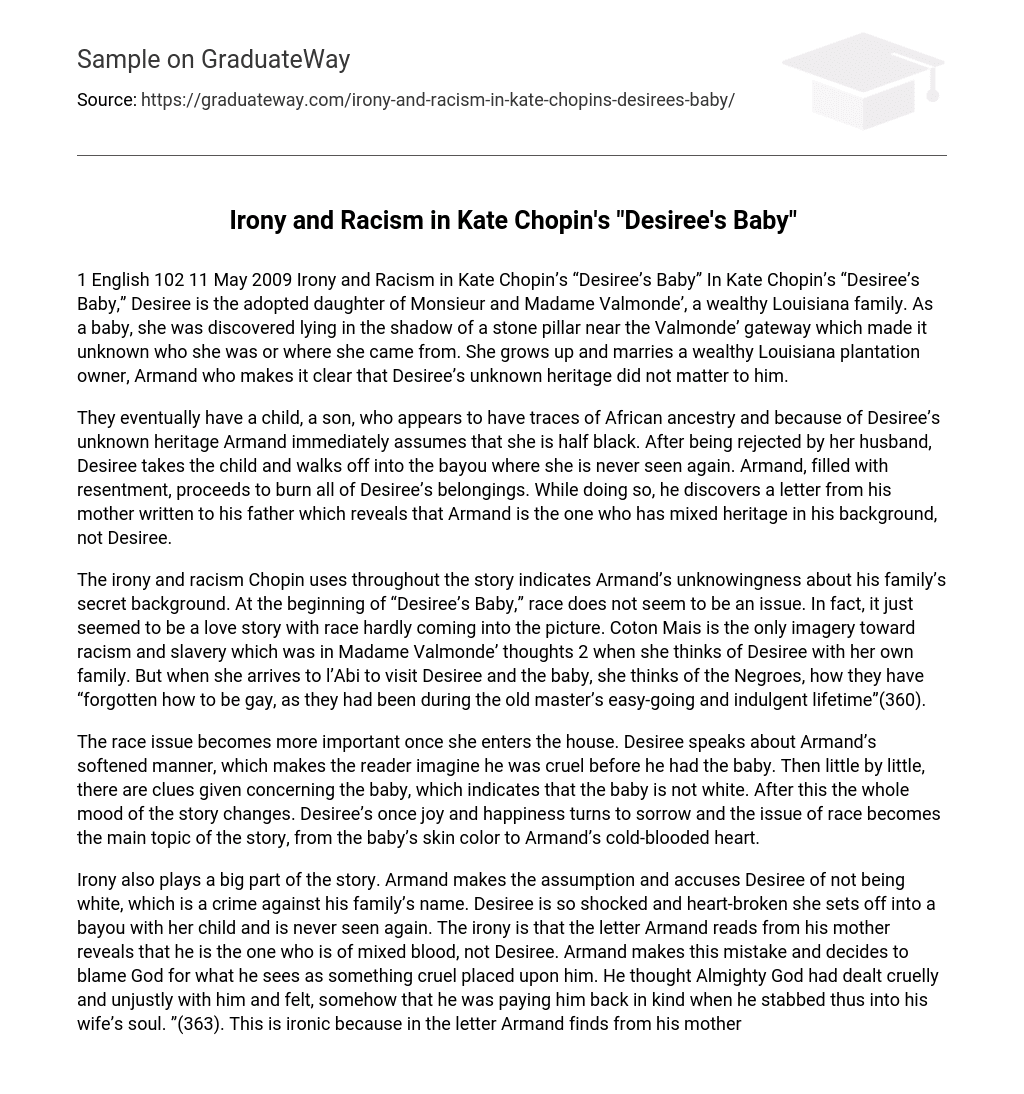In Kate Chopin’s “Desiree’s Baby,” Desiree is the adopted daughter of Monsieur and Madame Valmonde’, a wealthy Louisiana family. As a baby, she was discovered lying in the shadow of a stone pillar near the Valmonde’ gateway which made it unknown who she was or where she came from. She grows up and marries a wealthy Louisiana plantation owner, Armand who makes it clear that Desiree’s unknown heritage did not matter to him.
They eventually have a child, a son, who appears to have traces of African ancestry and because of Desiree’s unknown heritage Armand immediately assumes that she is half black. After being rejected by her husband, Desiree takes the child and walks off into the bayou where she is never seen again. Armand, filled with resentment, proceeds to burn all of Desiree’s belongings. While doing so, he discovers a letter from his mother written to his father which reveals that Armand is the one who has mixed heritage in his background, not Desiree.
The irony and racism Chopin uses throughout the story indicates Armand’s unknowingness about his family’s secret background. At the beginning of “Desiree’s Baby,” race does not seem to be an issue. In fact, it just seemed to be a love story with race hardly coming into the picture. Coton Mais is the only imagery toward racism and slavery which was in Madame Valmonde’ thoughts 2 when she thinks of Desiree with her own family. But when she arrives to l’Abi to visit Desiree and the baby, she thinks of the Negroes, how they have “forgotten how to be gay, as they had been during the old master’s easy-going and indulgent lifetime”(360).
The race issue becomes more important once she enters the house. Desiree speaks about Armand’s softened manner, which makes the reader imagine he was cruel before he had the baby. Then little by little, there are clues given concerning the baby, which indicates that the baby is not white. After this the whole mood of the story changes. Desiree’s once joy and happiness turns to sorrow and the issue of race becomes the main topic of the story, from the baby’s skin color to Armand’s cold-blooded heart.
Irony also plays a big part of the story. Armand makes the assumption and accuses Desiree of not being white, which is a crime against his family’s name. Desiree is so shocked and heart-broken she sets off into a bayou with her child and is never seen again. The irony is that the letter Armand reads from his mother reveals that he is the one who is of mixed blood, not Desiree. Armand makes this mistake and decides to blame God for what he sees as something cruel placed upon him. He thought Almighty God had dealt cruelly and unjustly with him and felt, somehow that he was paying him back in kind when he stabbed thus into his wife’s soul. ”(363).
This is ironic because in the letter Armand finds from his mother, she is praising and thanking God for having “arranged” their lives, in a way to be born in a racist world and have a child like Armand. It is also ironic that he has destroyed Desiree’s life, but has also destroyed his as well. He lost the love of his life, he lost his child, and he has lost his family’s proud name.
Critic Roslyn Reso Foy says, “In the end, only Armand’s skin is genuinely colored-a ’dark, 3 handsome face”(Foy). In the story Desiree is nearly portrayed as being white. Stated from the story, “The young mother was recovering, and lay full length, in her soft white muslins and laces, upon a couch. ” After Desiree gave Armand her mother’s letter she stood next to him “like a stone image: silent, white, motionless”(362). In the end, the ironies in the story lead to the actual truth and show that Armand was in the wrong.
Armand’s character at the beginning of the story was that of a young man who has fallen in love with Desiree “as if stuck by a pistol shot,” (360) but is cruel toward his slaves. Then as it becomes obvious his baby has black ancestry, his attitude changes. “The old love light” disappears because he feels hurt, like he has been cheated even though he has been warned of Desiree’s unknown name. He should have known the risk of marrying her, but instead he lets the hate he has for a different race control the love he had towards his wife.
His actions towards Desiree, which has driven her to suicide leads the reader to believe that Armand had no idea that he is mixed with a different race. This is believable because Desiree was his true love and their child together made his love multiply. He would have not burned all of her things or even allowed her to leave. Had he known can he still have this strong form of racism knowing his own mother was probably half black? It is highly unbelievable for a man who can fall in love with a woman at first sight. Armand’s finding of the letter reveals to the reader his unknowingness about his true self.
All that he has done with giving up his wife and child, and burning everything that reminded him of Desiree and the baby because of race and what other may think, had all come crashing in on him by the ironies of a letter.
Work Cited
- Chopin, Kate. “Desiree’s Baby. ” Roots to Branches. Ed. Jeff Wiemelt, Jayetta Slawson, Natashia Whitton. New York: Pearson, 2007. 360-63
- Foy, Roslyn Reso. “Chopin’s Desiree’s Baby. ” The Explicator 49 1991: 222 Literature Resource Center. Sims Memorial of Louisiana Lib. 23 Mar 2009





